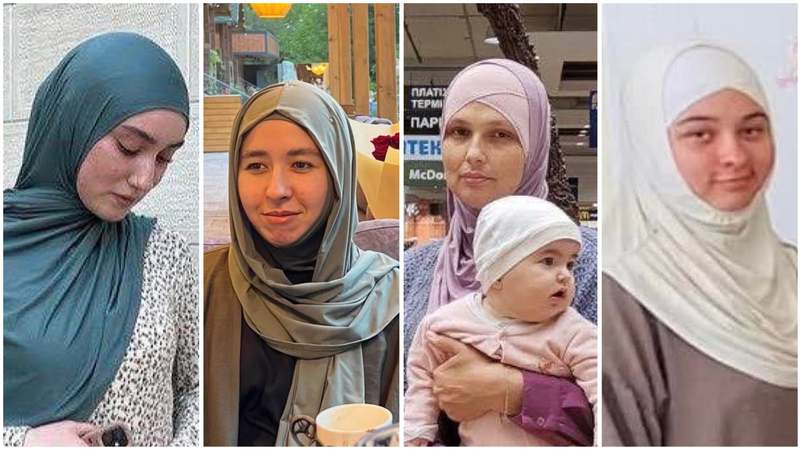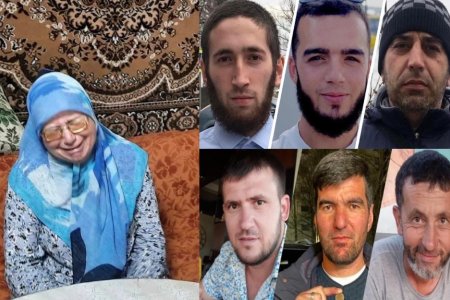
Armed FSB officers burst into several homes in occupied Crimea from 4 a.m. on 15 October, carrying out searches for so-called ‘prohibited religious literature’ and four ‘arrests’. Although the gratuitous violence and terror of such early morning ‘operations’ have been seen countless times before under Russian occupation, this raid was ominously different. The armed men had come for the wife of a political prisoner, the mother of their five children, as well as three very young Crimean Tatar women. This was the one ‘red line’ that Russia had not yet crossed in the terror and repression it brought to Crimea, with its conveyor-belt arrests on fake terrorism charges up till 15 October only targeting men.
Russia’s FSB go for easy targets and have already shattered several Crimean Tatar families. In August 2023, not content with having imprisoned the two elder sons of renowned Crimean Tatar historian Shukri Seitumerov, the FSB came for his youngest son. Six civic activists were seized that day, including Remzi Nimetulayev. Just over two years later, they came for Remzi’s wife, Esma Nimetulayeva. Her 73-year-old mother, Aliye Bekirova, was told by the men taking her daughter away that she should formally take over the care of her five granddaughters, as otherwise the state would take them away. She asked the men why they behaved like this, making children orphans when their parents are alive. “Their parents have done nothing wrong, they simply practise their faith. What right do you have to treat us like this?” she asked bitterly. The men were silenced but still continued their role in Russia’s most cynical abuse of flawed terrorism legislation as a weapon of repression in occupied Crimea.
Although the first time that women have been targeted, nothing else appears to be different in this case, with the four women: Esma Nimetulayeva (b. 1985); Elviza Alieva (b. 2005); Fevziye Osmanova (b. 2004); and Nasiba Saidova (b. 2006) accused solely of unproven involvement in Hizb ut-Tahrir. This is a peaceful, albeit controversial, transnational Muslim organization which is legal in Ukraine and which is not known to have carried out any acts of terrorism. The Russian supreme court’s outlawing of Hizb ut-Tahrir as ‘terrorist’ in 2003 was never explained, and was kept secret until it was too late to lodge an appeal. Under Russian occupation, it has become a weapon for Russia and its FSB against the Crimean Tatar human rights movement as well as against independent Muslim communities which distance themselves from the Russian-collaborating mufti. The FSB invariably designates at least one person as ‘organizer’ of a supposed Hizb ut-Tahrir group under Article 205.5 § 1 of Russia’s criminal code. The others are accused of ‘involvement’ in such a fictitious ‘group’ (Article 205.5 § 2). In occupied Crimea, Russia also adds an extra, preposterous, charge of ‘planning to violently seize power’, under Article 278.
Russian propaganda, of course, presents all of this very different with the TASS headline reading “A women’s cell of a terrorist organization has been uncovered in Crimea” The term ‘terrorist’ is used in each sentence at least twice although any activities mentioned (such as holding meetings) are, invariably, entirely legal.
The reality is very different. Esma Nimetulayeva (b. 9 January 1986) is a confectioner who had, since August 2023, been the sole parent bringing up her and political prisoner Remzi Nimetulayev’s five daughters, all of whom are under 18.
Elviza Alieva (b. 29 May 2005) is a fourth-year student at the occupation Vernadsky federal university, specializing in management. She has also been working as a sales assistant in a Simferopol bakery.
Fevziye Osmanova (b. 24 May 2004) is from Orlivka, just outside Sevastopol and works in a local shop.
Nasiba Saidova, who was born on 25 October 2026, is the youngest victim of Russia’s Crimean conveyor-belt ‘Hizb ut-Tahrir trials’. She is from Bakhchysarai region and the daughter of a well-known Imam. She herself is studying at a teacher-training college and also works at a nursery. The armed raid, that ended with her being taken away, began at 5 a.m. with both Nasiba’s husband and his father, Seit Saidov, forced to the ground and treated very roughly.
Saidov reports that the armed officers claimed to have ‘found’ some kind of books in a bedside table containing underwear. It remains unclear whether the FSB really fail to understand that no devout Muslim would keep religious literature in such a place, or whether they are demonstratively showing their contempt and disregard for any modicum of credibility. Saidov refused to sign the protocol of this ‘search’ in which only planted material was then ‘found’.
Renowned lawyer Emil Kurbedinov is representing Esma Nimetulayeva who is facing the more serious charge of ‘organizing’ a purported Hizb ut-Tahrir group, with it unclear as yet which charge will be brought against the other three women. It appears near certain that the women will all be remanded in custody during largely formal ‘hearings’ before the occupation ‘Kievsky district court’ on 16 October.
There are no grounds for expecting anything else to be different in this case, with horrific sentences passed as though for ‘terrorism’ without the women being accused of any recognizable crime or even plan to commit one. Nor, in fact, is any actual proof of involvement in Hizb ut-Tahrir required with the charges in all these ‘trials’ invariably based on the same planted ‘prohibited literature’; on fake ‘expert assessments’ by FSB-loyal ‘experts’ of illicitly taped conversations; and on the supposed ‘testimony’ of secret witnesses. The latter may well have never set eyes on the defendants before and be unable to answer the simplest question about them, but will give testimony which is a virtually word-for-word match with the indictment. ‘Judges’ from the Southern District Military Court in Rostov are well aware how flawed such ‘testimony’ is yet always dismiss legitimate objections to the secrecy from the defence, and also block defence questions aimed solely at showing that the alleged witnesses are lying.
This is a truly chilling new escalation in Russian terror.


